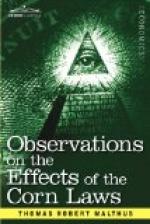This account of the manner in which the price of corn may be expected to operate upon the price of labour, according to the laws which regulate the progress of population, evidently shows, that corn and labour rarely keep an even pace together; but must often be separated at a sufficient distance and for a sufficient time, to change the direction of capital.
As a further confirmation of this truth, it may be useful to consider, secondly, the consequences to which the assumption of Dr Smith’s proposition would inevitably lead.
If we suppose, that the real price of corn is unchangeable, or not capable of experiencing a relative increase or decrease of value, compared with labour and other commodities, it will follow, that agriculture is at once excluded from the operation of that principle, so beautifully explained and illustrated by Dr Smith, by which capital flows from one employment to another, according to the various and necessarily fluctuating wants of society. It will follow, that the growth of corn has, at all times, and in all countries, proceeded with a uniform unvarying pace, occasioned only by the equable increase of agricultural capital, and can never have been accelerated, or retarded, by variations of demand. It will follow, that if a country happened to be either overstocked or understocked with corn, no motive of interest could exist for withdrawing capital from agriculture, in the one case, or adding to it in the other, and thus restoring the equilibrium between its different kinds of produce. But these consequences, which would incontestably follow from the doctrine, that the price of corn immediately and entirely regulates the prices of labour and of all other commodities, are so directly contrary to all experience, that the doctrine itself cannot possibly be true; and we may be assured, that, whatever influence the price of corn may have upon other commodities, it is neither so immediate nor so complete, as to make this kind of produce an exception to all others.




